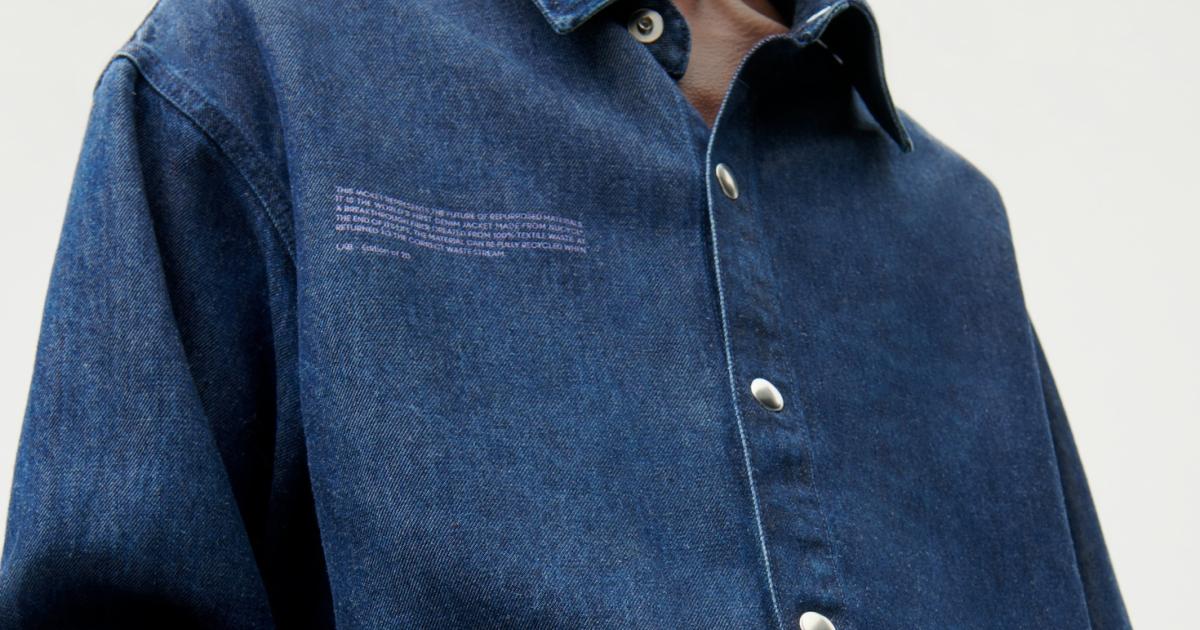
The emerging textile recycling industry will take another step forward in January when Seattle-based startup Evrnu breaks ground on a cotton recycling facility in South Carolina. The facility, which will run primarily on renewable energy and have the capacity to create the equivalent of 80,000 T-shirts every year from recycled cotton clothing, is scheduled to come online by the end of 2024.
Evrnu’s technology addresses a key hurdle in the apparel industry’s journey towards sustainability: Textile recycling today is basically nonexistent. Ninety-two million tons of textiles are thrown away each year. About 87 percent of all that material ends up in landfill. Less than 1 percent of the collected material becomes new garments in fiber-to-fiber recycling; most of the rest is downcycled — cut up to be used in rugs, insulation and other lesser-quality products.
Evrnu is partnering with U.K. fashion and textile innovator Pangaia to create recycled clothing made of denim — among the hardest-to-recycle versions of cotton.
Taking responsibility
Creating a viable, commercial-scale circular economy for cotton would drastically reduce the impact the cotton industry has on the planet. Over 25 million tons of cotton are produced globally each year. Cotton processing and production requires large amounts of water: about 10,000 liters of water for 1 kilogram of cotton. The crop also degrades soil quality, and increases pollution and carbon emissions from the production of and use of fertilizers and pesticides.
The top cotton producers are India (6.2 million tons), China (6.2 million tons) and the U.S. (3.6 million tons). The European Commission has proposed rules for extended producer responsibility (EPR), where the producer has to take responsibility (pay for) the entire life cycle of their products, including the waste they generate. EPR fees will go toward funding collection and recycling. Five states in the U.S. have passed EPR laws, primarily focused on packaging.
Creating a viable, commercial-scale circular economy for cotton would drastically reduce the impact the cotton industry has on the planet.
“In the United States, we landfill and incinerate somewhere around 90 million tons of textiles a year,” said Karla Magruder, founder of the nonprofit Accelerating Circularity. “We’re making a lot of new materials — putting energy, chemicals and water into them and … just throwing them away.”
“If we want to move to circular, textile-to-textile recycling systems, we need the whole system in place,” Magruder said.
Solid to liquid, and back
Stacy Flynn, founder and CEO of Evrnu, started researching the cotton recycling process in 2011 after a trip to China opened her eyes to the environmental damage produced by the textile industry. While studying for an MBA in sustainable systems at Pinchot University, in Washington state, Flynn shredded an old college T-shirt, dissolved it in a chemical solution and then, using a syringe, squirted the solution into a bath of sulfuric acid, which resolidified the liquified cotton into new “threads.” That was the first prototype of the process now called NuCycle. The patented system mechanically and chemically reduces a solid cotton to a pulp and then reconstitutes it into fibers for new clothes. The garments are first separated by a grading machine to select the clothes that are the closest to 100 percent cotton — the rest are discarded for traditional downcycling.
The end result, says Evrnu, is a premium fabric made from completely recycled cotton that performs like virgin cotton — and itself is 100 percent recyclable.
“By linking the existing waste supply chain to the existing apparel supply chain, we can start essentially creating a closed circuit supply chain as we create new products,” said Flynn.
Denim dilemma
Evrnu, which raised a $15 million Series B investment from its funders two years ago, works with garment collectors such as charities and distribution centers to get the initial clothing. Most of these garments would end up in rugs or insulation otherwise.
Evrnu is partnering with Pangaia on a denim jacket made entirely from recycled cotton. Pangaia sells hoodies, jackets, shoes and T-shirts made with its own sustainable alternatives including seaweed, eucalyptus and grapes, as well as collaborating and investing in other textile startups similar to Evrnu.
Pangaia wanted a product that was created from 100 percent recycled material and could be 100 percent recyclable. Designers chose denim, one of the most complicated and hardest to recycle textiles, largely because of the dying process.
“One of the beauties of denim is those dye molecules that chip off so you can see the white core,” Flynn said. “That’s what makes denim so cool.”
Evrnu’s fiber dyes more easily than traditional cotton, so it had to develop a method that would allow some of the color to fleck off while maintaining the integrity of the fabric. The collaboration created 20 Renu denim jackets that were sold for $400 each on Panagia’s website — a price Flynn that acknowledges is high. The clothing industry, she said, has been underpricing fashion for decades.
“Cheap product is way too expensive on the earth,” she said. “We as citizens have to pay for the fact that we’re not calculating in the cost of the damage to natural resources or people.”
The company also has a capsule collection with fashion retailer Zara using its NuCycle technology. Flynn said Evrnu has half a billion dollars in volume commitments from brands and retailers (none of which are public yet). With scale, she said, the price of the recycled fabric will start to come down.
“We’re starting to really train everyday consumers around the value of the things they put against their skin and to make better choices. Because if we’re doing damage to the environment or humans, it’s not worth it.”
- SEO Powered Content & PR Distribution. Get Amplified Today.
- PlatoData.Network Vertical Generative Ai. Empower Yourself. Access Here.
- PlatoAiStream. Web3 Intelligence. Knowledge Amplified. Access Here.
- PlatoESG. Carbon, CleanTech, Energy, Environment, Solar, Waste Management. Access Here.
- PlatoHealth. Biotech and Clinical Trials Intelligence. Access Here.
- Source: https://www.greenbiz.com/article/cotton-has-waste-problem-startup-says-it-can-solve-it
- :has
- :is
- :not
- :where
- $UP
- 000
- 1
- 10
- 100
- 20
- 2011
- 2024
- 25
- 7
- 80
- 87
- 90
- a
- accelerating
- addresses
- After
- against
- ago
- All
- allow
- also
- alternatives
- among
- amounts
- an
- and
- Another
- apparel
- ARE
- around
- AS
- At
- away
- b
- Basically
- BE
- because
- becomes
- been
- Better
- Billion
- brands
- breaks
- by
- calculating
- CAN
- Capacity
- carbon
- carbon emissions
- Carolina
- Centers
- ceo
- chain
- Charities
- cheap
- chemical
- chemicals
- China
- chip
- choices
- chose
- circular economy
- Citizens
- closed
- clothes
- Clothing
- collaborating
- collaboration
- collection
- collectors
- College
- color
- come
- commission
- commitments
- company
- completely
- complicated
- Consumers
- Cool
- Core
- Cost
- could
- create
- created
- Creating
- crop
- Cut
- cycle
- damage
- decades
- Denim
- designers
- develop
- distribution
- doing
- dollars
- down
- drastically
- Dying
- each
- earth
- easily
- economy
- emerging
- Emissions
- end
- ends
- energy
- Entire
- entirely
- Environment
- environmental
- Equivalent
- essentially
- Ether (ETH)
- Europa
- European
- european commission
- Every
- everyday
- existing
- expensive
- extended
- Eyes
- fabric
- Facility
- fact
- Fashion
- Fees
- fibers
- First
- five
- focused
- For
- Forward
- founder
- Founder and CEO
- from
- funding
- garments
- generate
- get
- Globally
- Go
- Ground
- had
- Half
- Have
- her
- High
- HTML
- HTTPS
- Humans
- hurdle
- if
- Impact
- in
- In other
- Including
- Increases
- india
- industry
- industry’s
- initial
- Innovator
- integrity
- into
- investing
- investment
- IT
- ITS
- itself
- January
- journey
- jpg
- just
- Key
- large
- largely
- Laws
- less
- Life
- like
- linking
- Liquid
- Lot
- machine
- made
- maintaining
- make
- MAKES
- Making
- material
- materials
- MBA
- method
- million
- more
- most
- move
- Natural
- Need
- New
- new products
- nist
- None
- nonexistent
- now
- nucycle
- of
- off
- Old
- on
- ONE
- online
- opened
- or
- Other
- otherwise
- own
- packaging
- partnering
- passed
- Pay
- People
- percent
- performs
- Place
- planet
- plato
- Plato Data Intelligence
- PlatoData
- Pollution
- Premium
- price
- primarily
- PRNewswire
- Problem
- process
- processing
- Produced
- producer
- Product
- Production
- Products
- proposed
- prototype
- public
- put
- Putting
- quality
- raised
- RE
- really
- recycled
- recycling
- reduce
- reduces
- Renewable
- renewable energy
- requires
- Resources
- responsibility
- REST
- result
- retailer
- retailers
- Rugs
- rules
- Run
- s
- Said
- says
- Scale
- scheduled
- see
- select
- Sells
- Series
- Series B
- she
- similar
- Skin
- So
- soil
- sold
- solid
- solution
- SOLVE
- some
- somewhere
- South
- South carolina
- start
- started
- Starting
- startup
- Startups
- State
- States
- Step
- Studying
- such
- supply
- supply chain
- Sustainability
- sustainable
- system
- Systems
- Take
- Technology
- textiles
- than
- that
- The
- their
- Them
- then
- These
- they
- things
- this
- those
- Throwing
- to
- today
- tons
- too
- top
- toward
- towards
- traditional
- Train
- trip
- two
- U.K.
- u.s.
- United
- United States
- university
- use
- used
- using
- value
- viable
- Virgin
- volume
- want
- wanted
- was
- washington
- washington state
- Waste
- Water
- Way..
- we
- Website
- WELL
- were
- What
- when
- which
- while
- white
- whole
- will
- with
- works
- worth
- would
- year
- years
- yet
- you
- Zara
- zephyrnet








